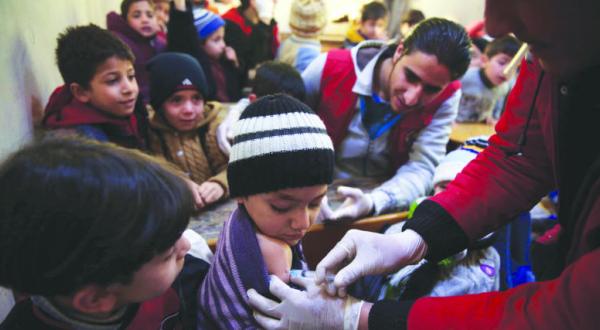
Members of the Syrian Arab Red Crescent vaccinate children from a primary school in Duma, northeast of the capital Damascus yesterday (AFP)
The House of Commons International Development Committee opened an investigation yesterday regarding the way in which UK counter-terrorism laws are hampering and affecting the humanitarian work of British Islamic charities operating inside Syria.
Andrew Mitchell and Clare Short, two former international development ministers, raised this issue with senior officials in government and questioned whether government aid is being diverted from Islamic charities. Nearly a fifth of government aid goes to charities.
Mitchell, who was the Secretary of State for International Development from 2010 to 2012, and Short, who held the same post from 1997 to 2003, urged the government to open an inquiry into growing complaints by Islamic charities.
The affected charities, including Islamic Relief, one of the largest Muslim charities that was praised by David Cameron during the 2010 election campaign, say their urgent humanitarian work is being disrupted either by banks nervous of falling foul of counter-terror legislation or by civil servants anxious that some of the funding may fall into the wrong hands.
Short said “This is an issue that needs clarifying and sorting out. It has been around as a problem for some time, but it has been getting worse and worse. We have got this enormous capacity of these Muslim humanitarian charities in the UK, yet they are struggling with one hand behind their backs. We need a proper scrutiny and examination bringing all this out. It is preventing efficiency.”
Mitchell said: “These are some of the few charities that can get into Syria and help the benighted people of that country, yet they are being held back due to misunderstandings and banking bureaucracy.”
The government has set up an interdepartmental working party to look into the issue after complaints were made. Mitchell and Short visited southern Turkey to see some of the work being undertaken by the Muslim Charities Forum to get aid into Syria, and returned full of praise for their work.
It is claimed that banks, many fearful of US legislation, are either closing the charities’ accounts or blocking money transfers due to the organisations being put on a risk register, often solely on the basis of newspaper reports. Others have reported that their Paypal accounts have been closed. Banks say they fear swingeing fines and reputational risk if they are seen to be facilitating terrorism.
Yet international law stipulates that, in a civil war such as the one raging in Syria, the consent of the faction or factions controlling territory is necessary for the delivery of aid. That requires interaction between charities and non-state groups controlling territory in which people require humanitarian relief. Factions often demand a fee or tax to allow right to pass, but this may fall foul of UK bribery legislation. There is also a prohibition against meeting members of proscribed organisations.
Islamic Relief is funded by the British Department for International Development. The International Media Coordinator for the charity Mohammed Shakir told Asharq Al-Awsat that “the major impact in this area has been related to the restriction on transfer of funds; restrictions in receiving funds and the withdrawal of banking services entirely. This has led to charitable programmes becoming delayed or suspended, with potentially serious and life endangering consequences for those benefiting from our programmes. Alongside this, there is an issue of access to areas such as conflict zones which in some cases involves proscribed groups”.
There are claims that many smaller Muslim charities have been blocked but want to avoid publicity, fearing that donors will be put off. Shakir continued by saying that “At this moment in time, Islamic Relief is working in Syria, Jordan, Lebanon and Iraq. Counter-terror laws have made it difficult to work in conflict zones due to the risk of being in contact or associated with proscribed groups. In an ideal world we would want to give aid and support to all who need it regardless of the part of the world they are in, but currently this is not possible”.
